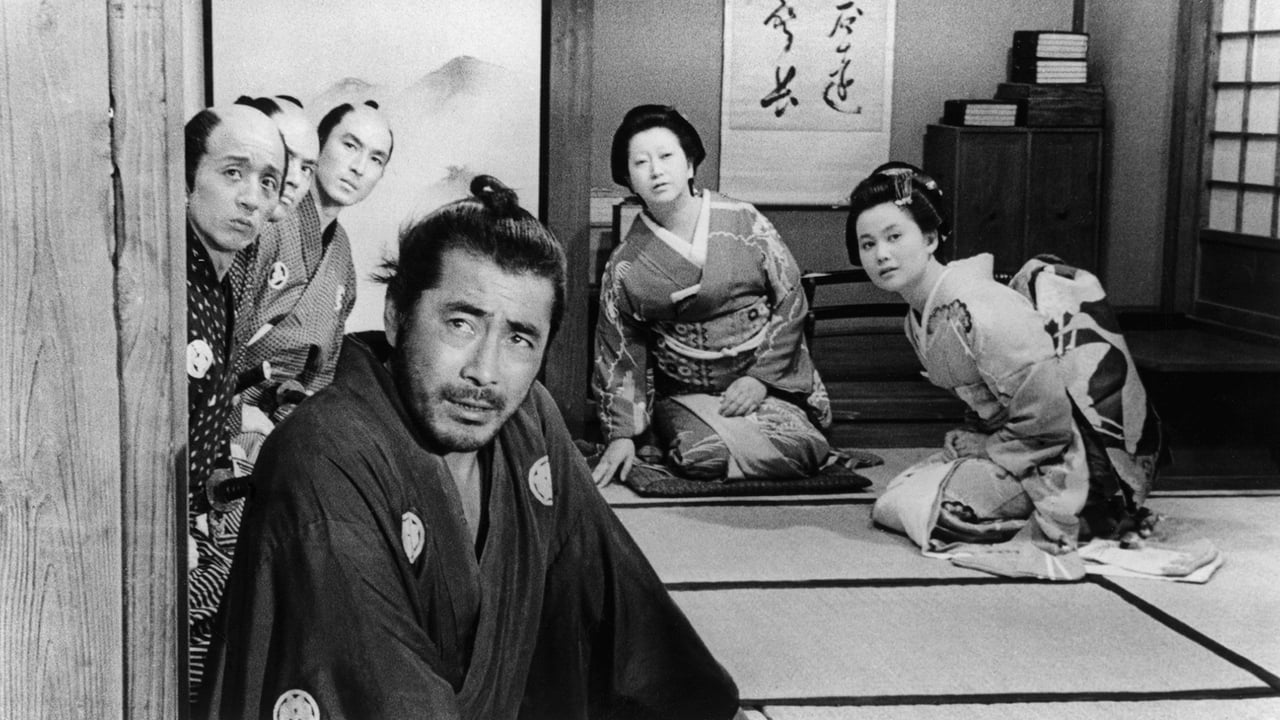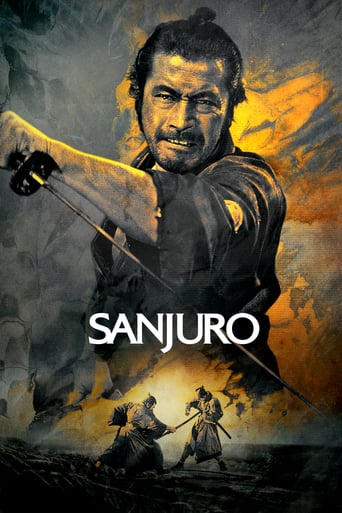

This Movie Can Only Be Described With One Word.
... View MoreSave your money for something good and enjoyable
... View MoreDon't listen to the negative reviews
... View MoreIt isn't all that great, actually. Really cheesy and very predicable of how certain scenes are gonna turn play out. However, I guess that's the charm of it all, because I would consider this one of my guilty pleasures.
... View MoreA wandering samurai, Sanjuro, is drawn into local politics. The Superintendent of a clan is plotting to take over the clan by implicating the Chamberlain in corrupt activities (activities the Superintendent is actually responsible for). Part of the plan involves killing off the Chamberlain's staff and, in protecting them, Sanjuro sides with them. The supporters are massively outnumbered so it will require all of Sanjuro's cunning and swordcraft to ensure the Superintendent does not succeed in his evil plan.Good action-drama, directed by Akira Kurosawa. Interesting, engaging storyline and some great action scenes. Toshiro Mifune (who else would be the lead? - this is Kurosawa!) gives his usual solid performance as the hero. You can see how Kurosawa's samurai movies and Mifune's acting influenced westerns (esp. Sergio Leone) and Clint Eastwood, respectively.However, not among Kurosawa's best (Ikiru, Seven Samurai, Yojimbo, Ran, Throne of Blood). Plot is a bit clumsy and feels contrived at times. Some turns of events seem implausible. Drags in parts and the Chamberlain's wife was quite irritating, limiting the character-engagement.Great ending though with a very powerful message.
... View MoreThis is a funny little film from Kurosawa. It's designated as a sequel to the excellent Yojimbo, yet if there was ever a film that did not or even should not receive a sequel, it would be Yojimbo. Even though Mifune had the final victory, it was a bitter-sweet farewell to the age of the samurai...the gun replacing the blade. Here his character is once again whole, which goes against everything that Yojimbo's ending had stood for. It would not quite work as a prequel either...we sense that by the film's end the sword may never leave its scabbard again. It works best if you distance yourself from that storyline entirely and merely see this as another wandering samurai's tale. He is still the aged, weathered relic, but not of the past. He has the same trademark twitch in his shoulder and the arm resting in the sling that whips out with deadly force at a moment's notice. The action, like much of Kurosawa's samurai films, is theatrical and overly-dramatic, so much so in Sanjuro that it almost seems like he is parodying his own style. The score pipes up appropriately to highlight these little comic flourishes; the dozen young samurai emerging from the floorboards like frightened mice, them later cheering and celebrating before quieting down appropriately, the cornered officials scurrying around and collapsing into a surrender (very reminiscent of the police chief from Yojimbo), or the humorous way in which Sanjuro tricks them into frantically hacking off white camellias and scattering them into the stream. Actually it doesn't so much as build to a dramatic climax as it cuts straight into it. It is a heart-stopping final duel. One swift blows sees the villainous Hanbei felled, without any of the dancing theatrics of the previous kills. His chest erupts with a fountain of blood like a geyser, and the pose is held for an eternity. Almost as if Sanjuro was willing for the moment to last that long, for that rush and thrill of killing a man to fill him up all over again...but the film has taught him otherwise. The fun and games are over. At the beginning he would kill dozens for just a small meal. In the end he almost would rather starve.
... View MoreSanujuro ( meaning 30) is the name of a ronin ( wandering, masterless samurai) during the modernization period of japan (mid to late 1800's).A sudden political change has occurred with the rise of the middle class and a more modern government not hinged upon an actual , all powerful godly emperor and aristocracy. But during this time much turmoil and corruption ran rampant through the country as outside influences with vested interests propelled the land into " do or die mode"; change or BE changed. Thus the political climate is one of unseemly individuals whom stop at nothing to cement themselves into positions of power and all in the way be damned to JIGOKU ( hell). But in the heat and lust for power a kindly, old fashioned politician is abducted by more devious sorts commonly associated with their station ( not too different form nowadays). So the nephew and loyal young vassals strive to formulate a plan of attack and brave all danger and cast discretion to the wind to save the honorable old man, even at the expense of their lives, for such is Bushido (the way of the samurai). However before embarking upon their errand , a surprise from a familiar face ( with the same name , look, style,,etc) named Sanjuro overhears them and shows them a more strategic way to fulfill their mission.Personally I believe this to be an indirect sequel, but still a sequel to the previous years smash genre hit, Yojimbo. Aside from the painfully obvious facts that the character with the same first name, style, look, vernacular and way of conjuring a family name from what ever he spies around him suggests this to be a sequel , there's also the constant lodging within temples that could point toward the penniless ronins true return to film, as well as the clever usage of the number 30 ( sanjuro) that shares his name throughout both films. Kurosawa did nothing without thought, and this film was very much more thoughtful than the first ( yojimbo).To put it simply: the first film was almost all comedy and farce, whereas the second film this review is primarily concerned with is much more a tale of the times it takes place in; a political intrigue period piece, filled with action, better set design, props, extras galore, moxy if you will. The directors penchant for tongue and cheek is no more than the veritable "spice of life" as I call it, that all humans whom have lived experience in this life. But even with a tad comedic realism, this film has much more character, captivates and requires more attention and intellect to follow and is just an all around superior film. I highly recommend this to anyone seeking older films that do not reek of unnecessary melodic overtones or dance routines. The best black and white films didn't need such things. Now go enjoy a fine film!
... View MoreThis is the sequel to 'Yojimbo'. Toshirô Mifune returns as the wandering ronin Sanjûrô Tsubaki. He encounters nine naive samurai who wants to confront corruption. One of the samurai had confronted his uncle the lord with the accusations. The response was dissatisfying so he tells the superintendent. The superintendent tells the nephew to gather his men. The ronin immediately smells a trap, and the corrupt superintendent launches a raid on the group. Only the ronin's smarts saves the group. Now the uncle and his family are taken prisoner and the ronin endeavors to rescue them with the help of the nine naive samurai. Only the clueless nine are sometimes more problematic with their distrust of the often napping ronin.This is a funnier movie than Yojimbo. Sanjuro does battle more with his brains than with his sword. The best swords are kept in their sheaths. However there is that great scene of drawing of the swords at the end. The guy imprisoned in the closet has a good funny scene. It's a very good sequel to Yojimbo with a funnier tone.
... View More